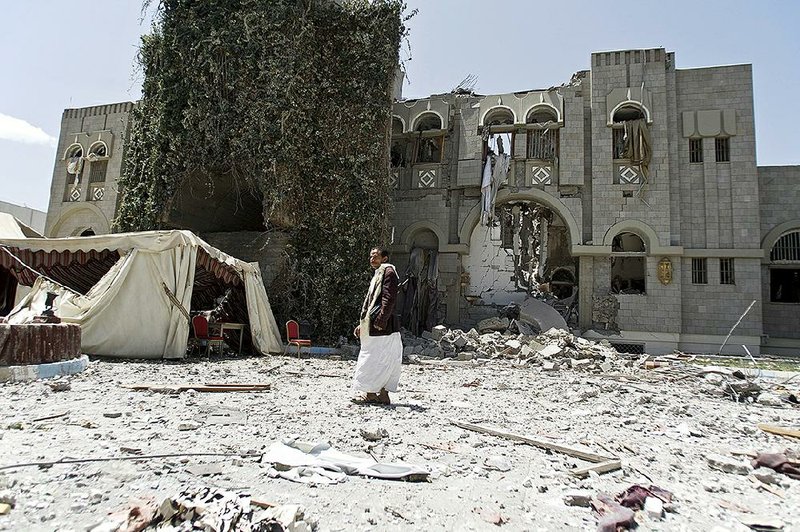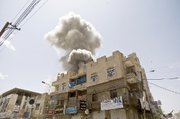SANAA, Yemen -- Yemen's Houthi rebels said Sunday that they had agreed to a five-day cease-fire proposed by Saudi Arabia that would allow desperately needed humanitarian relief supplies to be delivered to the country, according to a Houthi-controlled news service.
Yet as the Houthis' acceptance of the cease-fire was announced, the Saudi-led military coalition bombed the residential compound of Ali Abdullah Saleh, Yemen's former president and the Houthis' most important ally in the war. The residence, in Sanaa, the Yemeni capital, was struck at least seven times early Sunday, according to witnesses. Saleh, who survived, made a statement on television afterward, using the rubble of his compound as a backdrop.
Saleh, once a Saudi ally, denounced the "cowardly" attacks and for the first time publicly declared his allegiance to the Houthis.
On Sunday, state news agency SABA, which is under the control of the Houthis, quoted Col. Sharaf Ghalib Luqman as saying rebels in the armed forces agreed with the cease-fire. The Houthis earlier issued their own statement saying they will cooperate with the cease-fire and urged a return to dialogue.
The cease-fire would begin at 11 p.m. Tuesday. Since proposing a halt in the hostilities, the Saudi-led coalition has ratcheted up its bombing campaign, in an apparent effort to inflict as much damage as possible on the Houthis and their allies before any pause in fighting.
The airstrikes on Saleh's residence and in the northern province of Saada, a Houthi stronghold, also reflected a desire by the Saudi-led coalition to claim a military victory -- perhaps by killing pro-Houthi leaders -- after a six-week bombing campaign that analysts say has failed to meet most of its original goals.
The latest round of attacks came after pro-Houthi forces shelled a Saudi border town, causing several casualties and sparking anger in Saudi Arabia.
More than 1,400 people have been killed since March, when Saudi Arabia began the aerial assault against the Houthis, a Shiite movement from the north that had taken control of Yemen's capital and forced the government from power.
The United Nations says about 6,000 have been injured since the conflict escalated, while more than 300,000 people have fled the nation.
Saudi Arabia, whose leadership views neighboring Yemen as part of its sphere of influence, says its bombardment is meant to restore the internationally backed government of ousted President Abed Rabbo Mansour Hadi, who is now in exile in Saudi Arabia. The administration of President Barack Obama has supported the Saudi bombing campaign.
The Houthis have weathered the onslaught and continued to fight for control of several parts of Yemen.
The Houthi rebels, who had placed Hadi under house arrest before he fled the country, accuse Riyadh of working with al-Qaida gunmen and other militias in an attempt to dominate Yemen.
In a statement accepting the cease-fire, the Houthis said the group would "respond" to any violation of the truce by "al-Qaida or those who stand with them." The Houthis frequently assert that their opponents, who include southern separatists, supporters of Hadi, moderate Islamists and more hard-line groups, all belong to al-Qaida.
The Houthis also said in a statement that the Saudi-led coalition naval blockade prevented merchant ships carrying food from docking in the port of Hodeida.
Medical officials said some 70 wounded were evacuated from Aden onto a ship where they will be treated, with some severe cases being taken to Saudi Arabia. They spoke on condition of anonymity because they weren't authorized to brief journalists.
Also Sunday, the Saudi national press agency said that a contingent of Malaysian forces had arrived at Saudi air bases, making it the 12th country to join the coalition. It did not give details on the size of the detachment, and Malaysian officials were not immediately available for comment.
Saudi officials view the Houthis as a proxy for Iran, Riyadh's major regional rival for influence in the region. The Houthis say their alliance with Iran is political and not military.
The Saudi escalation over the past few days had drawn sharp criticism from human-rights groups as well as the United Nations. Saudi officials told residents of Saada on Friday to leave the area and declared the province a military zone.
In a statement Saturday, Johannes Van Der Klaauw, the U.N. humanitarian coordinator for Yemen, said, "The targeting of an entire governorate will put countless civilians at risk.
"The indiscriminate bombing of populated areas, with or without prior warning, is a contravention of international humanitarian law," he added.
Saleh's residence in Sanaa sits in a densely populated area and near large shopping malls. Several airstrikes hit his compound overnight and early Sunday, slightly injuring a grandson and a brother-in-law of Saleh and two other people, according to people close to the former president who asked not to be named to discuss what happened.
On Sunday morning, Saleh appeared on a local television channel, wearing a blazer and tie, in front of the ruins, condemning the strike as he taunted his attackers.
Saleh denounced the attacks as "barbaric aggression" and declared his support for the Houthis, whose rise to power sparked the 6-week-old Saudi air campaign.
It was widely known that Saleh and military units loyal to him had sided with the Houthis, whose forces seized Sanaa in September, and later expanded their control elsewhere in the nation. But this appears to be the first time that Saleh has publicly declared his allegiance to the Houthis.
The bombing had not targeted him, but "the nation," he said. He warned citizens to be alert for "sleeper cells," working on behalf of the Saudis, and promised compensation for victims of the military campaign.
Saleh ruled Yemen for more than three decades and left office in 2012 after an uprising against his autocratic rule. The deal that secured his exit -- while also providing him with immunity from prosecution -- was brokered by Saudi Arabia and other Persian Gulf states.
But he remains an influential figure in Yemen. Security forces still loyal to him have fought alongside the Houthis, participating in the siege of the port city of Aden, where hundreds of people have been killed.
"With rockets and warplanes, you do not achieve any of the goals you seek," Saleh said Sunday. "You are welcome on the ground: Move and we will meet you with a wonderful welcome."
He denounced the Saudi-led air campaign as "a war of extermination, a war of vengeance and hatred against the Yemeni people."
After his television appearance, warplanes bombed Saleh's compound again.
Information for this article was contributed by Mohammed Ali Kalfood, Kareem Fahim and Merna Thomas of The New York Times; by Zaid Al-Alayaa, Patrick J. McDonnell and Nabih Bulos of the Los Angeles Times; and by staff members of The Associated Press.
A Section on 05/11/2015


